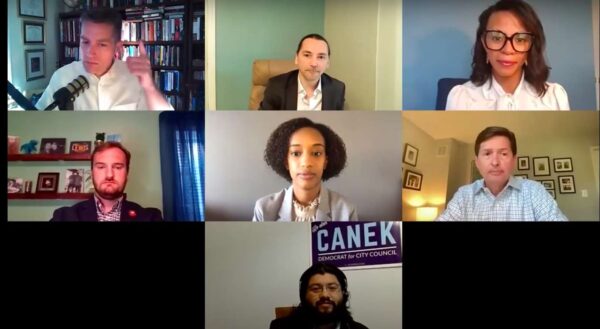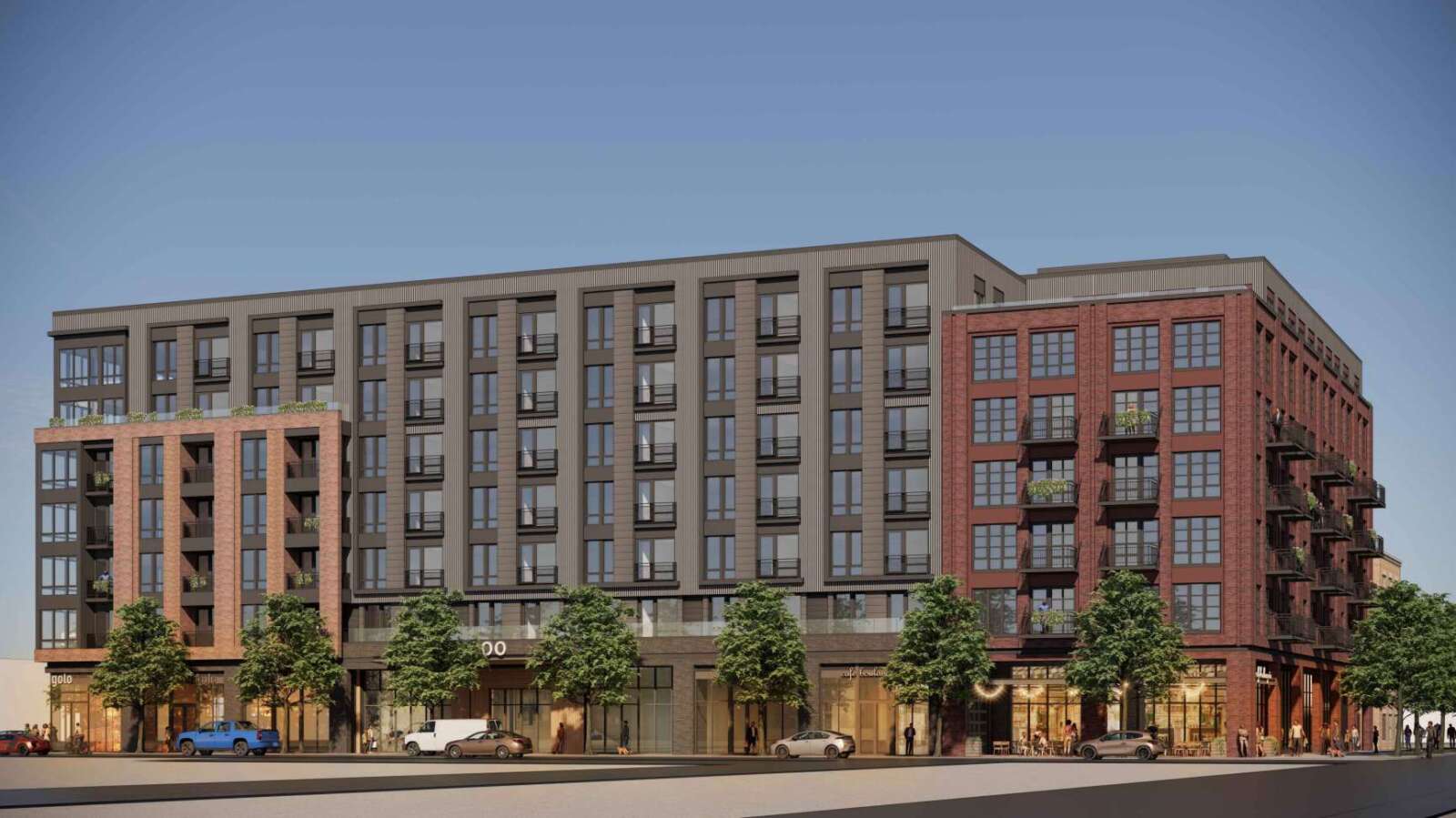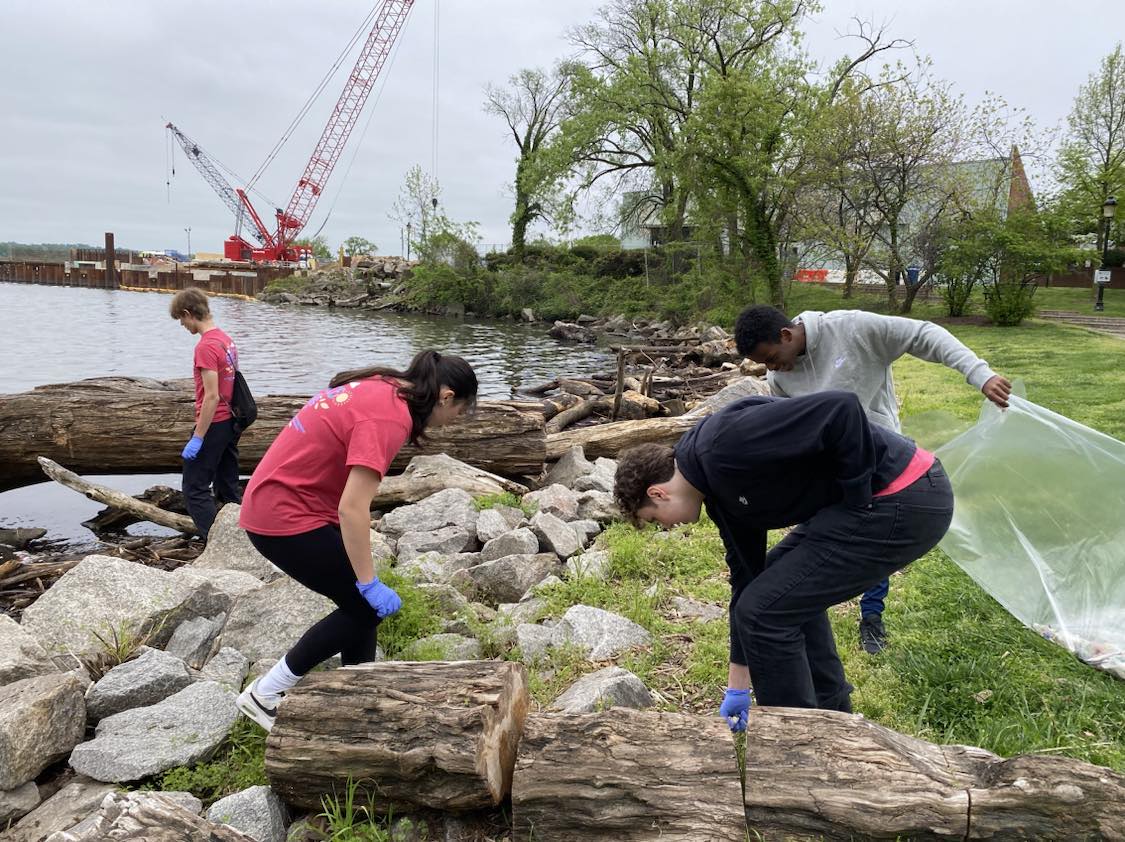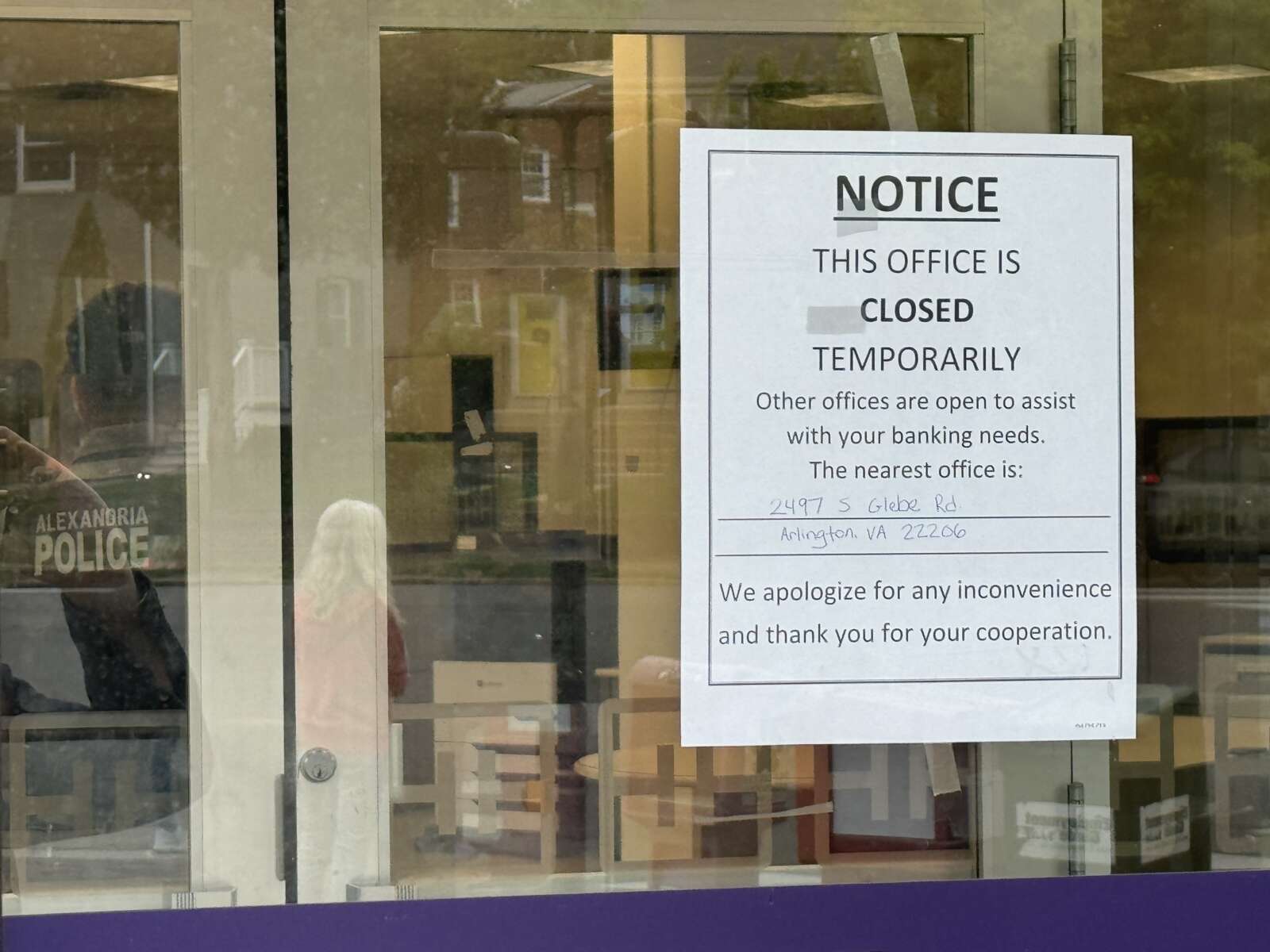In a crowded City Council election, the Alexandria Democratic Committee split the candidates into two groups for moderated debates, which posted last night.
The debates, moderated by Alexandria Gazette-Packet journalist Michael Lee Pope, touched on various issues that have become critical talking points in city races over the last few years, from parking to broadband to — of course — Seminary Road.
The first of the debates covered by ALXnow featured candidates Bill Rosello, Canek Aguirre, Mark Shiffer, Meronne Teklu, James Lewis, and Alyia Gaskins. Answers are summarized in the order given to each question. A recap of the second debate will be posted tomorrow (Thursday).
Parking Minimums vs. Parking Maximums
Should the city emphasize minimum parking requirements or setting maximum limits on parking at new developments? Most candidates said that they didn’t agree with picking just one, but picking a flexible option.
Canek Aguirre — If pressed to pick one, he said “maximums”, but argued that the city needs to have flexibility in approaching the issue.
“When we’re doing development, we have to make sure infrastructure is in place to support it,” Aguirre said. “Parking requirements are just another piece of that.”
Mark Shiffer — Shiffer said parking limits should be tailored to where the development is.
“Where there’s not enough parking, we want developers to bring in more parking,” Shiffer said. “But where there’s public transportation… there’s an oppurtunity to have less parking. I’m not a one-size-fits-all solution type guy.”
Meronne Teklu — Teklu said the emphasis should be on expanding transportation access to the city’s residential areas.
“I see both sides,” Teklu said. “I’m also mindful of investing in multimodal transportation… ensuring an adequate supply of bikeshare or scooters.”
James Lewis — Lewis noted that he was on the Transportation Commission when the recommendation was made for the current parking ratio standard and said the city is on the right track with its established parking minimum.
“We established a parking minimum, not maximum, because some developments were going to need it,” Lewis said. “What we did was tie the parking ratio to access to transit. That’s the right solution. We did this on the residential and commercial side.”
Lewis said a couple pieces haven’t been finished, like what to do when office parking isn’t being used by those workplaces.
Alyia Gaskins — “We need to look at context,” Gaskins said, “We need to look at the type of development, not looking at this as black and white.”
Bill Rossello — Rossello said the city should approach each development individually to determine what’s best, but said generally his concern regarding parking was overdevelopment.
“It’s a tactical question that’s posed here,” Rossello said. “My biggest concern is that we’re overdeveloping right now. We need to pause and rethink strategy. I agree with Mark and [James], we should do some analysis of the site and the area and existing analogues in that area.”
Affordable Housing
Pope asked candidates to draw the line at what’s too far regarding co-location of affordable housing, namely whether accessory dwelling units (ADUs) and co-locating at schools should be considered.
Mark Shiffer — Schiffer said he was against co-locating at schools, saying there were better approaches to the problem, and said there are problems with the city’s ADU policy. Mainly, Shiffer said exceptions in the floor area ratio limits encourages people to build more impervious surfaces.
Meronne Teklu — Teklu said she wouldn’t be opposed to co-locating housing at schools, and similarly would want to look at co-locating housing with libraries and other institutions.
“I think there’s a lot of innovative ways [to approach this],” Teklu said, “[but] addressing this is key. More and more communities of color will be displaced.’
James Lewis — Lewis said he supports ADUs, though there’s still work to be done on fine-tuning the policy. Lewis also expressed opposition to co-locating affordable housing at schools.
“Specific to co-location: I do not favor,” Lewis said. “We’re over capacity already and need to focus on capacity, not whether or not to put housing at schools. Until we solve that problem, it’s not something that should be on the table.”
Lewis said he would also push for greater focus on affordable home ownership, which he said is an underfunded piece of the budget.
“That’s the way you build stability,” Lewis said. “That’s how you generate generational wealth.”
Alyia Gaskins — Gaskins said the city should aim for a more comprehensive strategy.
“We’re talking about production of more units,” Gaskins said, “but we should not be talking about affordable housing without talking about protection from eviction and seniors staying in home.”
Gaskins also said she would not support co-locating affordable housing at schools, citing concerns about capacity.
Bill Rossello — Rossello repeated concerns expressed throughout the campaign that the city has an inaccurate depiction of how great affordable housing demand is in the city. His position is that the city should focus on providing affordable housing for city residents who are being pushed out of their homes, but not aim to solve the regional affordable housing crisis.
“One question I’ve had that I can’t seem to get answered is: what is the demand?” Rossello said. “If it’s not that big, it might lead us more towards increased subsidized for folks being priced out who already live here. The focus should be on the people who live here first and foremost. I don’t think the city discriminates between residents and non-residents, I think we need to favor residents and people who have a historical tie to this community. That’s what builds fabric.”
Gaskins pushed back that a local preference policy is a violation of fair housing law, but Rossello argued there’s nothing in the law that prohibits it.
Rossello also said that, as the only person in that half of the debate who has had his children go all the way through ACPS, that he had concerns about safety of co-location.
“There are safety issues and concerns,” Rossello said.
Canek Aguirre — Aguirre expressed support for ADUs and said he would not take co-location of affordable housing at schools off the table.
“We do have to take an all-hands-on-deck approach,” Aguirre said. “It would be irresponsible of us not to be considering everything on the table.”
Aguirre said co-locating housing or recreation centers with schools can be considered, and dismissed if it’s not a good fit. Aguirre also pushed back against Rossello’s expressed concerns about safety calling them a “dog whistle“.
“We’ve got housing next to our schools all over the place,” Aguirre said. “It’s not something that’s not normal.. It bothers me when the security issue gets brought up. We’re not saying schools are going to be on-top of housing… the security issue is just a dog whistle.”
Flooding
After historic floods over the last few years in Alexandria, the topic of improving the city’s stormwater infrastructure has been brought up repeatedly on the campaign trail. While incumbent Canek Aguirre said the city was making good progress on those goals, other candidates argued there’s more the city should do to step those efforts up.
Meronne Teklu –Teklu said the city should utilize funding from the American Rescue Plan to work on modernizing the city’s stormwater infrastructure.
“Supporting our environment is critical,” Teklu said. “We need to act locally and think globally.”
James Lewis — Lewis said the city should refer to the City of Alexandria Storm Sewer Capacity Analysis (CASSCA) study to see where the most impacted areas are and dedicate funding accordingly.
“We need to start looking at capacity problems and stop chasing maintenance,” Lewis said. “Until we solve capacity, we’re going to blow out those pipes.”
Alyia Gaskins — Gaskins said the city should prioritize investments in high capacity projects, but said that should rely not-solely on the CASSCA study.
“The CASSCA guide was in 2016,” Gaskins said. “I’m not suggesting another study, but we have 311 data and pictures and videos [from flooding],” Gaskins said. “We need to take data from the study along with real-time information.”
Bill Rossello — Rossello said the city should have been doing more over the last several years to expand its stormwater infrastructure, particularly as the city was aware of the thousands of residents new development was adding.
“It’s not exciting work to do regular maintenance, it’s not cool stuff, but you gotta do it,” Rossello said. “The reason this happens is we allowed those pipes to get stopped up.”
Rossello said he’s incredulous that longtime members of the City Council will make substantial progress on stormwater infrastructure after neglecting it for decades.
“There are some new people on the council over this last term, but we also had a 13-term council member, someone going for 5th term and someone going for 4th term,” Rossello said. “These are issues that have been around for a long time and the folks who have been around have been part of the problem on that.”
Canek Aguirre — Aguirre defended the city’s recent track record on stormwater infrastructure, though acknowledged past lapses by the City Council.
“Yeah, I acknowledge that,” Aguirre said. “That’s why there’s four new people and we’re trying to address this head on.”
Aguirre said policy implemented in 1994 has allowed the city to require certain stormwater benefits on new development, and said one of the problems is the city doesn’t make this known.
“All new development has aided us in the way that we are addressing stormwater infrastructure,” Aguirre said. “I think the city needs to do a better job of explaining our policies and explaining that these infrastructure improvements are happening.”
Mark Schiffer — Schiffer said those policies need to be tightened up.
“We need policies for new development,” Schiffer said. “Any time we’re doing new development, have to look at environmental effects so we’re not adding to overstressed system.”
Collective Bargaining
Pope asked the candidates whether they supported the recent move towards collective bargaining and whether it should be expanded into protections against disciplining employees. All candidates supported the recent collective bargaining change, but differed on whether they supported allowing unions to defend members facing discipline.
James Lewis — Lewis said he supported collective bargaining for city employees and pushed for the state legislature to let the city take that further.
“Collective bargaining gives workers a seat at the table,” Lewis said. “We need to have collective bargaining: period, full stop.”
Alyia Gaskins — Gaskins said she supported collective bargaining and said she would push for the protections to be expanded to include more protections for diversity.
Bill Rossello — Rossello said he supported collective bargaining as it would help address many problems raised over the years regarding inadequate employee compensation.
Canek Aguirre — While Aguirre supported collective bargaining, he said he was a hard-no on allowing public servant unions to defend members against discipline as he’s concerned it would allow police unions to shield members from justifiable discipline.
“It’s one of the issues with police departments nationally,” Aguirre said. “We can open ordinance back up later, but I cannot support discipline [protections at this time.”
Mark Shiffer — Schiffer said he supported collective bargaining and said discipline should be considered, though he would not commit to supporting or rejecting it until he heard the arguments and saw the policy.
Meronne Teklu — Like Aguirre, Teklu said her reticence for approving collective bargaining protections from discipline were rooted in police unions shielding their members from scrutiny.
“It’s an important question for where we are in our world,” Teklu said. “I fully support of collective bargaining and the right to unionize. As much as I am in support of that I want to recognize, in moment of Black Lives Matter, [the need] to hold folks accountable. I want to ensure we don’t let bad apples fall through the system.”
Broadband
This city has been working for years on expanding its broadband coverage and City Council candidates weighed in on the importance of that and what they see as the future of internet access.
Alyia Gaskins — Gaskins said it’s good that the city has been moving forward with expanding broadband, but needs to make sure that it can be done while minimizing additional disruptions to daily life.
“This has to be a priority,” Gaskins said.
Bill Rossello — Rossello said that improving internet access is going to be an increasing priority as work-from-home likely remains a feature of everyday life for Alexandrians post-COVID, adding that the city can’t afford to fall behind on this.
“This has been an issue for as long as we’ve had connectivity,” Rossello said. “It seems like everywhere else there is already competition… This should be a real priority.”
Canek Aguirre — Aguirre said that after initial bids came in over budget, a revised search came back with bids under-budget and the city is moving forward on installing capacity for broadband.
“We’re going to be moving forward with infrastructure for broadband,” Aguirre said. “It’s the foundation and starting block for public ISP. We’ve been working on it and making progress.”
Mark Shiffer — Shiffer said it’s not a high priority for him, but that he supported anything that added more competition to the local internet provider scene.
“Anywhere there’s cable service there’s not enough competition,” Shiffer said. “5G is coming. Hopeful that will help with some of these problems.”
Meronne Teklu — Teklu said that making it easier for companies to come in and install broadband is a priority.
“As someone with tech background, I’ve seen the importance and need for internet connectivity and connection,” Teklu said. “5G is here and and it’s important to invest in broadband. I think the RFP is great first step. An additional step is also to support accessibility to hardware itself. ACPS has done a great job providing laptops to students.”
James Lewis — Lewis said the city is currently on the right course.
“It’s one of those areas where city is in right track and needs to stay the course,” Lewis said. “We’re laying two lines, and that’s exactly what we should be doing. We still have struggle with the state about the last mile, which is why we’re doing this RFP, but we need to solve this problem now and we need to make sure this is affordable for people.”
Seminary Road
The last question has been the White Whale for many elected officials in Alexandria: the Seminary Road diet. It’s been a controversial issue that’s been lying low since the city mostly finished the planned dieting, but Pope asked whether candidates would have supported the road diet and whether they’d support spending money to reverse the road diet.
Bill Rossello — Rossello has been a vocal critic of the Seminary Road diet, which he acknowledged at the debate, but said it’s unfortunately often characterized as bicycle vs car.
“I’m pretty well known for this issue because I fought against the road diet,” Rossello said. “I’m an avid bicyclist, I’m not anti bicyclist. I’ve been to BPAC meetings to talk to them about things. This was an issue where we took an arterial road and narrowed it, a busy road… that people in this city depended on.”
Rossello said that 13 civic associations had pushed for the city not to do this, and Rossello said the city didn’t listen to them or to the Traffic and Parking Board, which also voted against the project.
“For the future of road diets, for them where they make sense,” Rossello said.
Rossello also said he would be in favor of spending money to restore the previous level of travel lanes for cars to Seminary Road, though he said he would keep intact some of the safety improvements the city made in the process.
Canek Aguirre — Opposite Rossello was Aguirre, who stood by the city’s decision to put a road diet on the street.
“I would absolutely not spend the money to revert it,” Aguirre said. “Part of the reason we were doing this was to improve access for all road users. If you go out there right now you’ll see people walking dogs, on bikes, on scooters. Most people don’t see this because they drive past it… Even though 13 civic associations contacted us, were getting people contacting us on Seminary Road saying ‘please do this.’ On Council, there’s a lot of information you’re getting that other people don’t see.
Mark Shiffer — Schiffer said overall, he was opposed to road diets.
“It’s taking a product approach,” Shiffer said. “Apple doesn’t beat you over the head with their products, they make their products easy to use, and you spend a lot of money for the pleasure to use them.”
Meronne Teklu — Teklu said she wouldn’t spend money to go back and redo project, but said the city needed to be more focused on data driven decision making.
“I would like to explore: how do we do more data driven decision making on how we target streets for road dieting moving forward,” Teklu said.
James Lewis — Like Rossello, Lewis has been vocally opposed to the Seminary Road diet, voting against it on the Traffic and Parking Board and saying it created an unsafe situation for bicyclists by abruptly ending the bike lane at the Quaker Lane intersection.
“We shouldn’t end bike lanes at an interstate and shouldn’t end them at an unsafe intersection,” Lewis said. “There was just an accident at Seminary and Quaker this week. dumping people at an intersection that we know is unsafe is a bad idea.”
Lewis said the city is just now starting to redesign the intersection. Aguirre pushed back that the city can’t always do all of its connectivity at once — that the budget simply doesn’t allow for that — but Lewis argued that this wasn’t an excuse to build something hazardous in the meantime.
“I understand connectivity is part of the process, but we shouldn’t be designing things that we know are unsafe,” Lewis said. “There were people saying it was a bad idea and we know it was unsafe.”
Alyia Gaskins — Gaskins argued that whether or not Seminary Road was a good idea, the city can’t spend the money to go back to reverse it.
“If we have extra $700,000,” Gaskins said, “I want to make sure we’re using that to keep people in their homes facing eviction, going hungry every night, and making sure we’re stewarding our resources.”
ALXnow will post the second debate, featuring the remaining candidates for City Council, tomorrow. The Democratic Primary is scheduled for June 8.
Photo via AlexDems/YouTube
Recent Stories
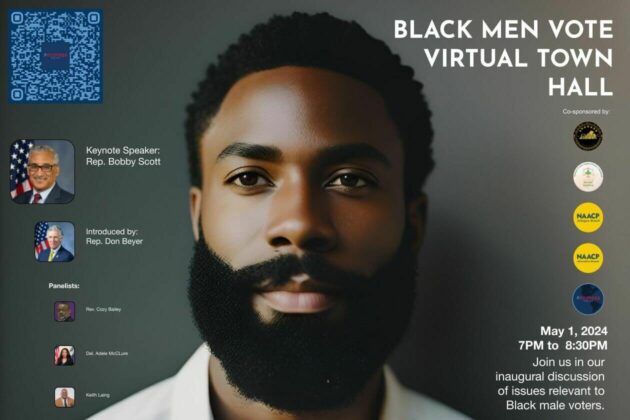
For Immediate Release
Progress for All Announces Inaugural Black Men Vote Virtual Town Hall
Date: April 19, 2024
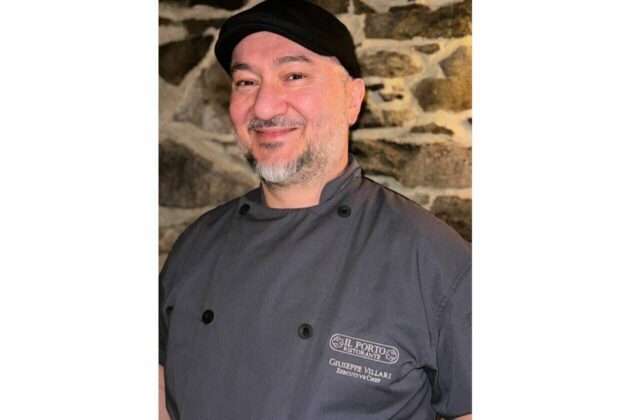
Il Porto Ristorante is thrilled to announce that a new executive chef has joined our team! Hailing from Sicily, Italy, Chef Giuseppe’s culinary journey began at home, where he was immersed in the rich aromas and flavors of homemade Italian cuisine from a young age. His culinary skills flourished further in Piedmont, Italy, where he had the privilege of learning from esteemed chefs renowned worldwide. Under their mentorship, he refined his craft and developed a unique culinary style that marries classic Italian traditions with contemporary flair. Now, Chef Giuseppe proudly brings his exceptional talents to Il Porto, infusing each dish with his distinct blend of tradition and innovation. Chef Giuseppe is introducing brand new dinner specials and entrees, so make a reservation to enjoy his culinary excellence, today!
Pro Coro Alexandria – To the Sea
Join Pro Coro Alexandria, the chamber choir of the Alexandria Choral Society, this Saturday for our concert, “To the Sea.” Experience a variety of songs from beloved choral classics like “Shenandoah” and “What Shall We Do With A Drunken Sailor?”
Del Ray Kitchen Confidential Design Tour
Please join us for Del Ray Kitchen Confidential – a walking tour of recently renovated kitchens in Del Ray with the experts who make the magic happen! FA Design Build owner Rob Menefee and Design Consultant Melissa Fielding walk us


